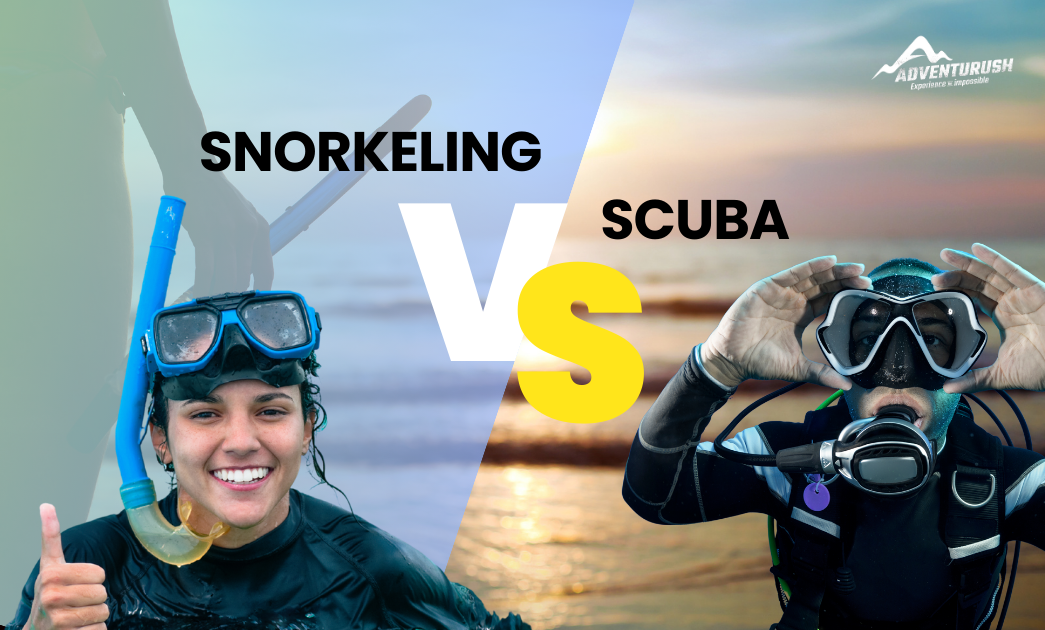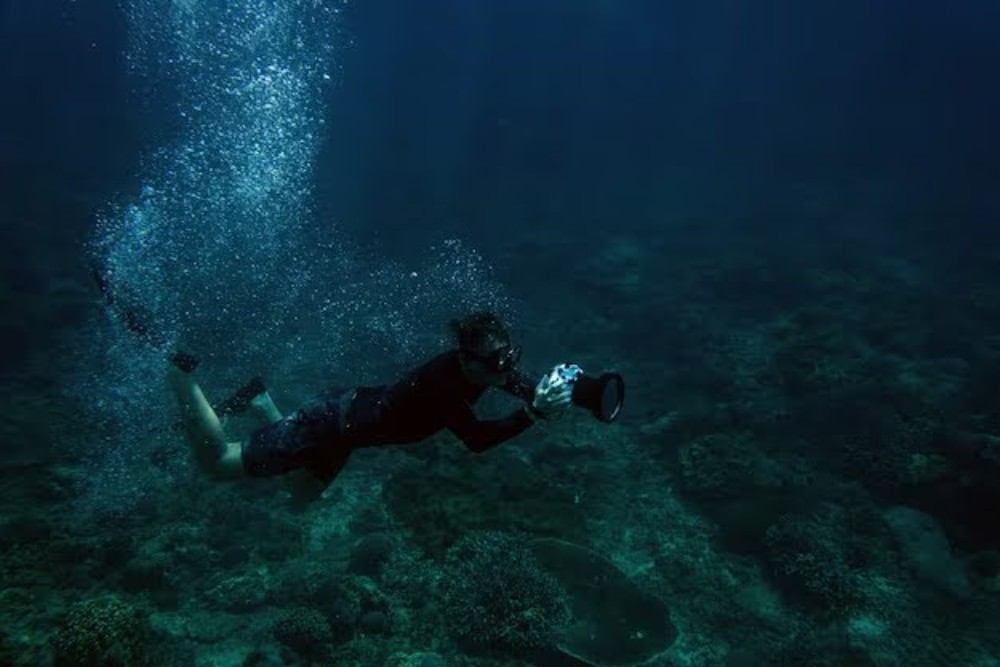No products in the cart.

- AdventuRush
- | Leave a comment
- 320
Snorkelling vs. Scuba Diving: What’s the Difference?
Table of Contents:
- Introduction
- What is Snorkeling? An Overview
- Exploring Scuba Diving: What Does it Involve?
- How Do Snorkeling and Scuba Diving Differ?
- Comparison Points
- What Are the Safety Considerations for Each Activity?
- Which is Right for You: Snorkeling or Scuba Diving?
Did you know that about 70% of the Earth’s surface is covered in water, yet a vast majority of it remains unexplored? This fact sparks many discussions on snorkelling vs scuba diving, as both activities draw adventurers keen on exploring underwater.
While both offer a glimpse into the mesmerizing underwater world, they are different experiences. Snorkelling is often seen as a leisurely activity, allowing you to float on the water’s surface and peek into the marine life below. On the other hand, scuba diving is a deeper dive (quite literally!) into the aquatic realm, enabling enthusiasts to explore underwater wonders more intimately.
In this article, we will explore the snorkelling vs scuba diving debate, highlighting the key distinctions that set these two popular aquatic adventures apart.
What is Snorkelling? An Overview
Snorkelling enables observing underwater ecosystems while swimming on the surface. It simply requires a snorkel, a mask for viewing, and fins for propulsion. With just these three pieces of inexpensive, easy-to-transport gear, snorkelers access exciting encounters with sea creatures and reefs.

To enjoy snorkelling, participants don a mask with integrated snorkel and fins. Then, they grip the snorkel tube and place their face below the water’s surface. Breathing normally through the apparatus, they spot dazzling fish and formations.
Common sites include coral reefs teeming with underwater inhabitants. Tropical destinations often offer snorkelling excursions transporting participants to optimal spots via boat. Then snorkelers explore on their own or with a guide pointing out highlights.
Since it involves surface-level swimming without bulky equipment, snorkelling appeals for several reasons:
- Accessible for most ages and fitness levels
- Minimal gear enables easy transport
- Lower cost than scuba
- Provides exciting marine life sightings
Exploring Scuba Diving: What Does it Involve?
Scuba diving provides more extensive underwater access through the use of breathing tanks. “Scuba” represents an acronym for “self-contained underwater breathing apparatus.”
This gear allows divers to remain below the surface without needing to surface for air. Scuba divers carry their oxygen supply in back-mounted tanks connected to a breathing regulator.

Certification serves as a prerequisite for scuba diving. Participants first complete training on gear use, safety protocols, and technique. Once certified, scuba divers can rent equipment at most water port hubs. Groups then embark on dives led by an instructor or dive master.
Scuba diving differs by:
- Requiring certification classes teaching specialized skills
- Use of complex breathing apparatus enabling underwater endurance
- The ability to descend deeper than snorkelling allows
- Higher cost for equipment and excursions
While scuba diving demands more training, it opens up extensive underwater exploration that is impossible through snorkelling. Divers enjoy longer, deeper exposure alongside marine residents by carrying their air supply.
How Do Snorkeling and Scuba Diving Differ?
While snorkelling and scuba diving enable observing underwater life, they vary in equipment, requirements, depth, and other factors. Outlining those differences helps determine which pursuit aligns best with individual interests, skill level, and budget.
| Comparison Points | Snorkelling | Scuba Diving |
| Gear Needed | Simple swim gear of mask, snorkel tube, fins | Complex apparatus including air tank, regulator, buoyancy control |
| Training Required | None | Formal certification course |
| Water Depth | Surface and up to 15-30 feet below | Much deeper, up to 130 feet |
| Time Underwater | Short durations, coming up often | 1-2 hours continuously |
| Expense | Inexpensive | Higher equipment and trip costs |
| Physical Demands | Casual swimming ability | Moderate endurance and fitness |
| Learning Curve | Very accessible | Steeper with more specialized skills |
The table above summarizes key differences between snorkelling and scuba diving in their required gear, depth, cost, and other noteworthy contrasts.
What Are the Safety Considerations for Each Activity?
When enjoying any water sport, safety is essential. Snorkeling vs scuba diving each have recommendations for safe participation. However, scuba diving requires more intensive protocols due to the underwater breathing equipment. Using compressed air tanks also necessitates additional precautions.
For snorkelers, basic open-water safety applies. Travelling with a partner, wearing a colourful vest, and being attentive to surroundings helps prevent issues. First-timers also benefit from snorkelling with an experienced guide.
With scuba diving, specialized training prepares participants to handle equipment challenges that could arise. The certification covers emergency protocols like buddy breathing if a tank fails.
Additional considerations include:
- Carefully checking gear before each dive
- Closely monitoring air supply
- Ascending slowly to prevent illness
- Diving within personal experience level
Maintaining up-to-date certification and diving with a partner provides key safeguards as well. Adhering to protocols taught while first learning ensures scuba remains an exciting adventure.
Which is Right for You: Snorkeling or Scuba Diving?
When deciding between snorkelling and scuba diving excursions, travellers should evaluate their factors to determine the best match. Key considerations include your skill level, fitness, budget, time constraints, and interest in maintaining certification.
Snorkelling appeals to families travelling with young children. Kids as young as 5 or 6 can often participate alongside parents in these surface-level wildlife viewings requiring no formal training. Experienced swimmers find snorkelling an easy introduction to observing underwater ecosystems.
In contrast, scuba diving enables more extensive underwater access and endurance through the use of breathing tanks. Its uninterrupted air supply allows certified divers to stay submerged for over an hour.
When evaluating snorkelling vs scuba diving for your next tropical getaway, first consider your appetite for more casual or committed underwater exploring. Ultimately, whether you choose snorkelling or scuba diving, both activities promise an unforgettable glimpse into the aquatic world.
For those leaning towards scuba diving and seeking an exceptional experience, AdventuRush offers a unique opportunity. They provide a scuba Boat Dive in Havelock – Andaman, starting from just 4999. This adventure combines the thrill of diving with the serene beauty of the Andaman Sea.
As you think over snorkelling vs scuba diving for your next marine adventure, remember that both offer unique ways to connect with the ocean’s mysteries, each with its own set of unforgettable experiences and joys.